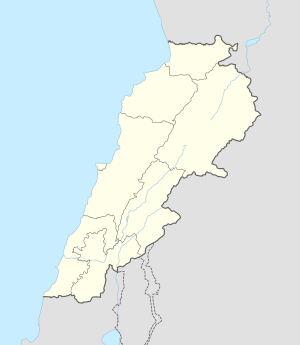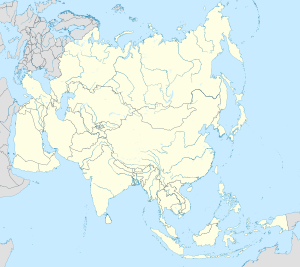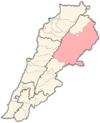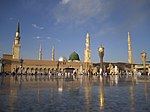Al-Nabi Shayth
Al-Nabi Shayth
ٱلنَّبِي شَيْت ٱلنَّبِي شِيْت Nabi Chit | |
|---|---|
Village | |
 Mosque of the Prophet Seth in the village of the same name | |
| Coordinates: 33°52′20″N 36°06′46″E / 33.87222°N 36.11278°E | |
| Country | |
| Governorate | Baalbek-Hermel |
| District | Baalbek[1] |
| Elevation | 4,000 ft (1,220 m) |
Al-Nabi Shayth (Arabic: ٱلنَّبِي شَيْت, romanized: An-Nabī Shayth, lit. Prophet Seth) is a village in eastern Lebanon, located in the Beqaa Valley[2] and Baalbek District.[1] The village's name comes from the considered burial-site of Seth the son of Adam. A mosque was built on the burial site and it contains the grave of Seth inside the mosque (a rival tradition placed Seth's tomb in the Palestinian village of Bashsheet, and likewise in the Iraqi city of Mosul).[3] The village is also the hometown of former leader and co-founder of Hezbollah, Abbas al-Musawi, as well as the hometown of other senior Hezbollah leaders such as the late Fuad Shukr. The village of Al-Nabi Sheeth is predominantly inhabited by people with the surnames Helbawi, Al-Moussawi, Hazimeh and Chokr.[4]
History
[edit]Ibn Jubayr (1145–1217 CE) noted:
the two graves of Seth and Noah [..] are in the Bika', and two days' journey from Damascus. One who measured the tomb of Sheeth (Seth), reported to us that it was 40 fathoms (ba') long, and the tomb of Nuh (Noah) was 30. The tomb of Noah's son lies side-by-side with that of Noah. There is a building over the tombs, and an endowment for charitable purposes.
— Ibn Jubayr[2]
In 1838, Eli Smith noted En-Neby Sheeth as a "Metawileh" village in the district of Baalbek.[1]
On 22 December 1998 the Israeli Air Force bombed a farm house in al-Nabi Shayth killing a woman and six children. The target had been an antenna belonging to Hizbollah's Voice of the Oppressed radio station. Hizbollah responded by firing rockets into Northern Israel, injuring sixteen people. Two weeks later the IAF again tried to destroy the radio mast, injuring seven villagers.[5] On April 14, 2024, the IDF carried out an airstrike on the settlement, claiming that they were targeting a Hezbollah run weapons manufacturing site.[6]
See also
[edit]References
[edit]- ^ a b c Robinson, E.; Smith, E. (1841). Biblical researches in Palestine, Mount Sinai and Arabia Petraea : a journal of travels in the year 1838. Vol. 3 (2nd appendix). Boston, the U.S.A.: Crocker & Brewster. p. 145.
- ^ a b Le Strange, G. (1890). Palestine Under the Moslems: A Description of Syria and the Holy Land from A.D. 650 to 1500. London: Committee of the Palestine Exploration Fund. p. 422. OCLC 1004386.
- ^ "ISIS destroys Prophet Sheth shrine in Mosul". Al Arabiya News. 2014-07-26.
- ^ "أسماء العائلات في بلدة النبي شيت، قضاء بعلبك، محافظة البقاع في لبنان". إعْرَفْ لبنان. Retrieved 2024-06-26.
- ^ Middle East International No 591, 15 January 1998 [sic] internal pages give correct year of publication: 1999; Michael Jansen p14. Second attack on 3 January 1999
- ^ "IDF confirms strike on Hezbollah 'significant weapons manufacturing site' in northeast Lebanon". Times of Israel. Retrieved 25 June 2024.
Bibliography
[edit]External links
[edit]- Nabi Chit Archived 2016-04-22 at the Wayback Machine, Localiban






